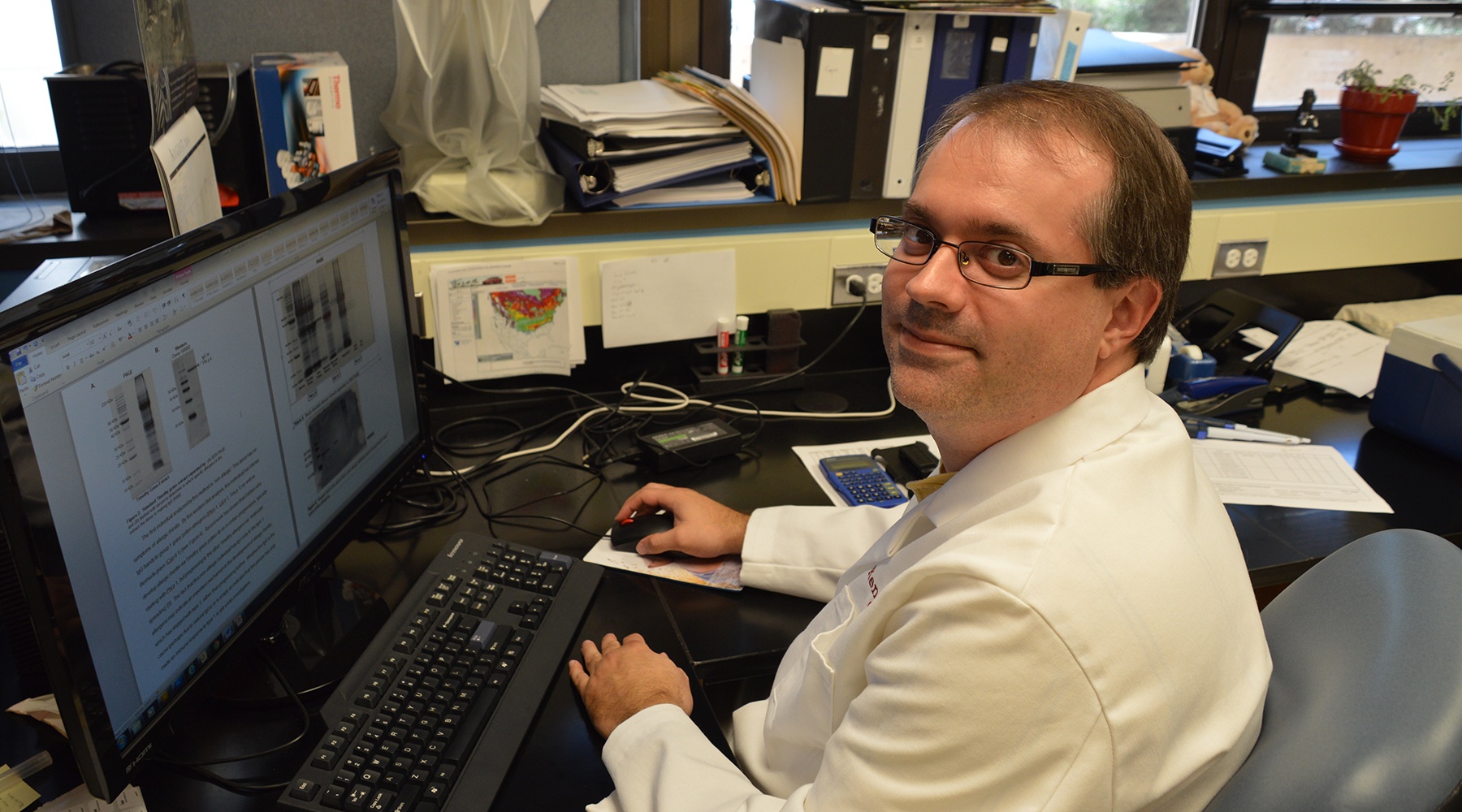Kenneth Smith, Ph.D.
Research Associate Professor
Arthritis & Clinical Immunology Research Program
Research
Our lab’s goal is the discovery and characterization of full length, fully human monoclonal antibodies cloned from single B cells after vaccination. We explore the use of these antibodies as novel therapeutics and diagnostics for infectious agents and also elucidate the B cell immunology which leads to these antibodies and the biology of the B cells that make them. Our primary focus is antibodies that bind to polysaccharide antigens, specifically from the Streptococcus pneumoniae (SPN) capsule. We are working to use these antibodies as novel treatments for severe pneumonia, as well as for diagnostics to both diagnose SPN infections and explore the epidemiology of SPN, for example, the distribution of antibiotic resistant and non-vaccine serotypes. We also have active projects producing and characterizing antibodies to anthrax toxins and rabies virus.
We are developing new methods for characterizing monoclonal antibodies from patients with systemic lupus erythematosus. We are working to better understand the B cell immunology that leads to autoantibody production, epitope spreading and affinity maturation.
We also explore aspects of general B cell immunology, including Vgene, light chain and isotype usage in immune responses to vaccination, infection, allergy and autoimmunity. Finally, we produce highly engineered antibody formats, such as bispecific antibodies and antibody-drug conjugates.
Publications
Recent Publications
Owens CD, Pinto CB, Szarvas Z, Muranyi M, da C Pinaffi-Langley AC, Peterfi A, Mukli P, Detwiler S, Olay L, Kaposzta Z, Smith K, Kirkpatrick AC, Saleh Velez F, Tarantini S, Csiszar A, Ungvari ZI, Prodan CI, Yabluchanskiy A. COVID-19 Exacerbates Neurovascular Uncoupling and Contributes to Endothelial Dysfunction in Patients with Mild Cognitive Impairment. Biomolecules 14, 2024 December, PMID: 39766328, PMCID: PMC11726736
Langford JB, Ahmed E, Fang M, Cupp-Sutton K, Smith K, Wu S. Strategies for Top-Down Hydrogen Deuterium Exchange-Mass Spectrometry: A Mini Review and Perspective. J Mass Spectrom 59:e5097, 2024 November, PMID: 39402881, PMCID: PMC11736408
Dai W, Sandoval IT, Cai S, Smith KA, Delacruz RGC, Boyd KA, Mills JJ, Jones DA, Cichewicz RH. Cholinesterase Inhibitory Arisugacins L-Q from a Penicillium sp. Isolate Obtained through a Citizen Science Initiative and Their Activities in a Phenotype-Based Zebrafish Assay. J Nat Prod 82:2627-2637, 2019 September, PMID: 31433188
Selected Publications
Smith K, Garman L, Norris K, Muther J, Duke A, Engler RJM, Nelson MR, Collins LC, Spooner C, Guthridge C, and James JA. Insufficient anthrax lethal toxin neutralization is associated with antibody subclass and domain specificity in the plasma of anthrax-vaccinated individuals. Microorganisms. 2021; 9(6):1204. PMID: 34199431, PMCID: PMC8229884
Wrammert J, Smith K, Miller J, Langley WA, Kokko K, Larsen C, Zheng NY, Mays I, Garman L, Helms C, James J, Air GM, Capra JD, Ahmed R, Wilson PC. Rapid cloning of high-affinity human monoclonal antibodies against influenza virus. Nature. 2008 May 29; 453(7195): 667-71. PMID: 18449194, PMCID: PMC2515609
Smith K, Garman L, Wrammert J, Zheng NY, Capra JD, Ahmed R, Wilson PC. Rapid generation of fully human monoclonal antibodies specific to a vaccinating agent. Nat Protoc. 2009; 4(3): 372-84.
Smith K, Crowe SR, Garman L, Guthridge CJ, Muther JJ, McKee E, Zheng NY, Farris AD, Guthridge JM, Wilson PC, James JA. Human monoclonal antibodies generated following vaccination with AVA provide neutralization by blocking furin cleavage but not by preventing oligomerization. Vaccine. 2012; 30(28):4276-83. PMID: 22425791, PMCID: PMC3367042
Smith K, Muther JJ, Duke AL, McKee E, Zheng NY, Wilson PC, James JA. Fully human monoclonal antibodies from antibody secreting cells after vaccination with pneumovax23 are serotype specific and facilitate opsonophagocytosis. Immunobiology. 2013; 218(5):745-54. PMID: 23084371, PMCID: PMC3556204
Smith K, Shah H, Muther JJ, Duke AL, Haley K, James JA. Antigen nature and complexity influence human antibody light chain usage and specificity. Vaccine 2016; 34(25):2813-20. PMID: 27113164, PMCID: PMC4876604
Contact
Arthritis & Clinical Immunology Research Program, MS 5
Oklahoma Medical Research Foundation
825 N.E. 13th Street
Oklahoma City, OK 73104
Phone: (405) 271-3275
Fax: (405) 271-3980
E-mail: Ken-Smith@omrf.org




